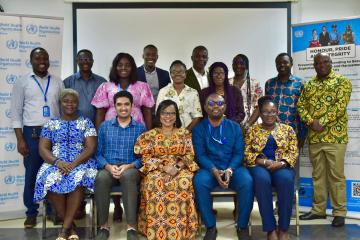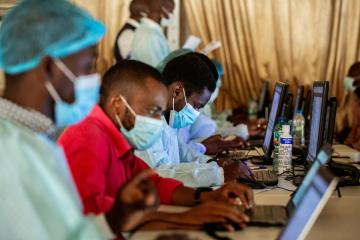- South Africa Medical Research Council, University of Rwanda.
- WHO Family of International Classification, along with the associated tools and processes
- United Nations Economic Commission for Africa (UNECA), Africa Centre for Disease Control and Prevention (ACDC), The United States of America’s Centre for Disease Control and Prevention (US CDC), United Nations Children's Fund (UNICEF), United Nations Population Fund (UNFPA), World Bank, o African Development Bank (AfDB), National Statistics Offices (NSOs), Government Ministries Responsible for Civil Registration and Vital Statistics Systems, and the Bill and Melinda Gates Foundation.
- Civil Registration and Vital Statistics
- Improving the sample registration systems for mortality reporting
- Global Fund to Fight AIDS, Tuberculosis and Malaria, Gavi (the Vaccine Alliance), University of Western Australia
- Harmonized Heath Facility Assessment
- West African Health Organization, Countdown to 2030 (African Population and Health Research Center (APHRC), University of Manitoba), African Union Commission
- Capacity building on data analysis
- Monitoring and evaluation
Introduction
The Health Information System (HIS) which refers to a structured mechanism for the collection, storage, analysis, dissemination, and utilization of health-related data to support decision-making at all levels of the healthcare system. It is one of the anchor pillars of a functional health system. A well-functioning Health Information System (HIS) is essential for monitoring and evaluating health sector progress, tracking disease trends, addressing health inequalities, and ensuring efficient resource allocation. It supports evidence-based decision-making, improves service delivery, and enhances overall health system performance.
Current challenges with HIS in the African Region:
Due to limited investment in national health information systems across most Member States in the WHO African Region, the systems face numerous challenges. As a result, data availability and quality remain insufficient in many Member States, and this hinders their ability to effectively use health data to improve health outcomes and support decision-making. For example, data collection and transmission efforts are often fragmented and heavily reliant on paper-based systems, which are inefficient, error-prone, and slow. The lack of widespread adoption and implementation of common data standards within and between countries makes it difficult to integrate and compare health data across regions and programs.
Furthermore, many Member States face a shortage of skilled personnel and resources needed to effectively collect, analyze, interpret, and utilize health data. This is further exacerbated by weaknesses in HIS governance and inadequate infrastructure, including limited access to technology and digital platforms for data storage, transmission, and sharing. Many countries prioritize routine health information systems over other important data sources and lack up-to-date HIS strategic plans and policies, hindering progress in improving data availability, quality and use.
Impact of these challenges on the national health information system
In 2021, the World Health Organization (WHO) published the SCORE (Survey, Count of Births and Deaths, Optimization of Routine Health Information Systems, Review of Strategies and Plans, and Enabling Data Use) assessment report, which highlighted significant gaps in the capacity of national health information systems to produce the necessary health data and statistics. (Figure 1). For example, the report revealed that 30 out of the 47 countries in the WHO African Region (64%) lacked the capacity to accurately count and register births and deaths. Additionally, the ability to diagnose the cause of death was nearly absent in most of these countries.

The report also revealed a somewhat high availability of data for reproductive, maternal, and newborn health, as well as health systems data, while the availability of mortality and non-communicable disease data was notably low (Figure 2).

A follow-up assessment is currently being conducted to evaluate whether Member States have made progress in enhancing the capacity of their national health information systems.





